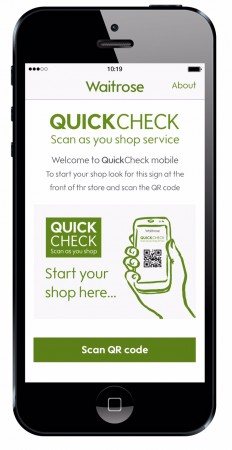As automation plays a growing role in the retail sector, co-operatives are exploring the opportunities and challenges brought by technological developments.
Retail automation can be described as using various devices and technologies to automate operations to lower costs and enhance productivity.
Joanne Denney-Finch, chief executive of the Institute of Grocery Distribution, discussed her vision of the future of retail at the recent Canadian Grocer Thought Leadership Conference in Toronto.
“Retailing is splitting into two parts,” she said, “one largely automated and super-efficient and the other based on delivering inspiration.
“The blueprint is already emerging, not in one single place but spread across the world.”
Ms Denney-Finch believes that greater automation of everyday, staple purchases will make customers look for excitement and creativity when doing their grocery shopping.
“Eventually distribution centres will be operated almost entirely by robots and trucks will drive themselves,” she said.
She added this process will extend into the kitchen. “Our smart appliances will use sensors to guarantee great cooking results and people will hand over many decisions to their smart devices.”
She is optimistic about the future of retail in this environment. “We’ll sign up to long-term deals, because that will be simplest and deliver best value,” she said. “As shoppers, our key staple items will turn up just in time, whenever we need them.
“On the other hand, as people’s lives keep growing more hectic, spontaneous buying and eating will also be even more popular.
“Online services will respond to this too, with meal kits and ready-to-eat food delivered to the door at rapid speed. Physical stores will always have the edge for instant gratification and for products we like to see before we buy.”
Ms Denney-Finch said shops in convenient locations, such as train stations, would be more favourable for shoppers in the future.
“They’ll become much more exciting, featuring lots of fresh food, new products, special events and more ways to taste, learn and discover.
“Experts will be on hand to give advice and deliver personal service. Branded manufacturers will be helping their retail customers to differentiate and deliver excitement because those that don’t will be marginalised.”
Another tendency will be an increase in the healthy food offer, she said.
“They’ll give the healthiest food the best locations supported through their pricing and promotions. And the provenance of food and the ethics behind it will be hugely important.
“It’ll be an even more transparent world and progressive companies will celebrate this. They’ll be really proud of the standards at every point of the chain for all the food they sell.
“So that’s my vision of the future. Shoppers will be delighted. Companies will be tested, but the best will really thrive.”
But it will become essential for companies to have a friendly face, she warned, bringing brands to life with a unique personality as life becomes more automated.
How can co-ops respond to these new trends?
Waitrose, part of employee-owned John Lewis, is the first UK supermarket to roll out the “scan as you shop” mobile app to all customers.
The self-scan app has been made available to all myWaitrose customers shopping in all Waitrose branches in June. They can use the app to scan product barcodes on their smartphones as they place products in their baskets.
This means products do not need to be scanned at checkout, making the shopping and checkout experience easier.
The app replicates Waitrose’s existing Quick Check handset service, introduced over ten years ago. The handsets are available in two thirds of Waitrose shops and the retailer is in the process of upgrading them. Customers can use the handsets to find out when there is an offer available on scanned products and keeps a running total of spend.

The retailer is considering additional functions for the app, such as digital shopping lists, the communication of relevant offers to customers as they shop, as well as integrating mobile payment.
In August, Waitrose became the UK’s first major supermarket brand to operate a cashless store after opening in Sky’s new head office building – Sky Central, with 3,500 staff. The employees are able to pay by card of through their mobile devices at one of the five self-service checkouts in the store.
The retailer also engaged with Sky employees to find out what they would like to see in the new cashless store. The store focuses on providing meals and food to go, as well as a selection of fresh produce and ingredients, celebration cakes, freshly cut flowers and fresh pastries.
Matt Clifton, Waitrose head of retail change, said: “The roll out of the Quick Check mobile app marks a real step change in our aim to make shopping with Waitrose as easy as possible and to lead the grocery sector in smartphone shopping.
“We know that customers are shopping little and often and therefore want the experience to be as convenient as possible. Being able to complete a whole shopping experience using only a smartphone means shoppers can scan as they go, benefit from tailored offers, detailed product information and pay anywhere in the shop.
“The dynamic world of smartphone technology means that the future capabilities of this app are endless.”